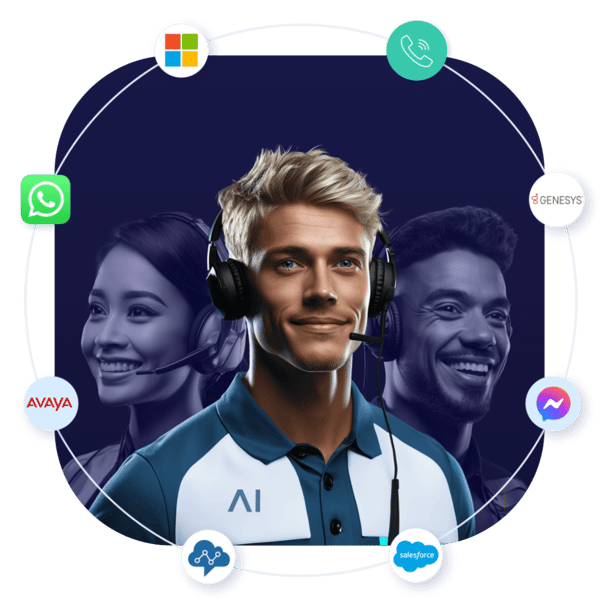Let’s face it – Large Language Models are incredibly powerful, but they alone aren’t (yet) optimized for enterprise deployments. From airlines and logistics to car dealerships, there is no lack of examples where GenAI-powered customer service bots miserably failed to connect with their users, or worse, caused significant brand damage.
That said, this shouldn't deter enterprises from leveraging Generative AI. Quite the opposite, a meticulous and strategized LLM deployment with calculated guardrails and a robust orchestration framework can offer a unique competitive advantage. Conversational AI (CAI) is a versatile tool to enable just that.
Why Conversational AI (Still) Matters?
The hype and disruption of GenAI and LLMs may deem traditional CAI systems outdated at first sight due to their reliance on intent-based NLUs, pre-defined rules, and logic flows. That said, such a task-specific nature, complemented by extensive integrations and multichannel connectivity of CAI is exactly what makes it even more relevant to harness LLMs for enterprise applications.
CAI excels in automating complex processes and user journeys, where precision, reliability, and control are vital. That means if you are dealing with large-scale, customer-facing deployments that are business-critical, CAI won’t go away anytime soon.
In this blog post, we explore nine concrete use cases of how you can capitalize on the language power of LLM within the controlled environment of CAI to get the best of both worlds. Let’s dive in!
1. Refining User Inputs with LLMs
2. Hybrid AI for Intent Recognition
3. Improving Entity Extraction
4. Transaction-Ready Knowledge AI
5. Prioritized Routing Based on the Customer Context and Sentiment
6. Accelerating Multilingual Training
Understanding Inputs
Using LLM to boost NLU performance is a low-risk, yet high-impact application for real-time conversations. It enhances the overall performance of your AI Agents while bypassing common threats like prompt injection and jailbreaking, as the prompts are confined within the backend.
1. Refining User Inputs with LLMs
Traditional NLUs grapple with processing long or ambiguous sentences because they depend on fixed ontologies and schemas. These systems may fail to grasp the subtleties needed for recognizing intent in extended discourse or when vital information is implicit rather than clearly stated.
A solution to this issue is employing (LLMs) to rephrase user inputs. For instance, when the input is overly verbose, summarizing it into a succinct statement using an LLM can enhance NLU-based intent recognition.
2. Hybrid AI for Intent Recognition
Trained on large, diverse datasets, LLMs are highly adaptable to the fluidity of human language, including variations in syntax, semantics, and idiomatic expressions. Blending NLU and LLM can improve the system’s proficiency in recognizing intents, especially those articulated in indirect or nuanced manners.
Cognigy offers a seamless method to refine your Intent models with a GenAI embedding model, enabling optimization at the click of a button. Alternatively, you can adopt LLMs as an NLU fallback to improve comprehension of user responses that aren't initially clear.
Lufthansa notably enhanced its AI Agents' intent recognition by 50% through the strategic application of GenAI with Cognigy. Watch here.
3. Improving Entity Extraction
Besides detecting user needs, LLMs are also a compelling tool to identify and extract relevant entities for automating processes and performance transactions. This is particularly relevant in voice scenarios where user utterances often entail multiple digression paths and are not always optimally transcribed by the Speech-to-Text software.
Finding Information
LLM-powered search, also known as Retrieval Augmented Generation (RAG), has become increasingly commoditized. GenAI models transcend keyword matching to consider the semantic meaning of the query and retrieve the most pertinent information across a vast pool of documents and knowledge sources. The augmented generation aspect then skillfully synthesizes and presents information as coherent and context-sensitive responses.
4. Transaction-Ready Knowledge AI
What distinguishes an enterprise-grade Knowledge AI solution from many standalone RAG-based solutions is its ability to enrich information retrieval with targeted task automation. This synergy not only provides answers to knowledge-based queries but also facilitates related actions, enhancing satisfaction and upselling.
For instance, when a customer inquires about baggage policy for special items, the AI Agent can offer a customized response based on the customer's ticket type, and then smoothly guide him through the process of booking additional luggage.
Making Decisions
In high-volume customer service applications, prioritizing queries, e.g., based on urgency, is essential for effective resource allocation while ensuring critical issues are addressed promptly. Using LLMs, you can analyze user responses in real time to strategically classify and prioritize inbound conversations.
5. Prioritized Routing Based on the Customer Context and Urgency Level
By combining CRM and contact center integration with LLM’s language understanding, Cognigy lets you seamlessly automate and orchestrate prioritized routing. Here's an example of how the process unfolds to enhance service efficiency and responsiveness:
- Identification: Determine if the contact is an existing customer via CRM lookup.
- Analysis: If the contact is a returning customer, use LLMs to evaluate:
- Whether the customer is following up on a previous issue.
- The urgency of the query.
- The customer sentiment
- Action: Based on this analysis, prioritize the customer in the queue or escalate the issue to a live agent as needed.
Multilingual Support
Combining NLUs with LLMs also extends the language coverage of Conversational AI systems to handle interactions in a broader array of linguistic contexts. Here are two methods where Generative AI can be strategically utilized:
6. Accelerating Multilingual Training
Each language comes with unique idiomatic expressions, slang, and cultural nuances. LLMs excel in capturing these details due to their training on vast and diverse datasets. As outlined in section 3, Cognigy offers a straightforward approach to optimize your NLU model by incorporating a Generative AI embedding model, expediting AI training and effectively bridging linguistic gaps.
7. Auto-Detecting User’s Spoken Language
When the same contact point, such as a hotline, is used to serve a multilingual customer base, it might be crucial for the AI Agent to automatically detect and transition to the user’s spoken language instantly.
Previously for voice deployments, you needed to rely on the speech vendor’s provided capabilities, which could be restricted to recognizing a limited number of languages simultaneously. Cognigy now lets you utilize LLMs to surpass these constraints and better cater to customer preferences.

Enhancing Outputs
When integrated with CAI, LLMs allow AI Agents to go beyond prewritten script and dynamically deliver context-aware and personalized responses – while remaining task-focused. With Cognigy, you can achieve this in two ways.
8. Empathetic Conversations
Customers often contact support when facing issues. Using LLMs, AI Agents can analyze customer sentiment and craft responses tailored to their concerns, ensuring each interaction feels uniquely personal.
9. Effective Digression Handling
Another aspect where the marriage of LLMs’ conversational prowess and CAI’s structured approach shines is managing digression, especially when collecting input for task execution. As conversations veer off the main path, this synergy allows the AI Agent to intuitively respond to off-topic requests while maintaining context and guiding the user back to the original question smoothly.
Why Multi-Model Orchestration is the Way to Go
GenAI innovation is moving at a dizzying speed, and with so many potential use cases, LLM orchestration will be central to a future-proof, optimized, and cost-efficient deployment. Such an approach allows you to mix and match the best models for your specific use cases – depending on factors like performance, cost, and customization.
With Cognigy, you have a centralized interface to orchestrate dozens of LLMs across all applications. Our robust orchestration framework gives you access to the most recent models from market-leading vendors like OpenAI, Azure OpenAI, Anthropic, Google, and Aleph Alpha – all at the click of a button, to stay at the forefront of the GenAI evolution.
Try it out yourself, or contact us to see it all in action!




.png?width=60&height=60&name=AI%20Copilot%20logo%20(mega%20menu).png)



